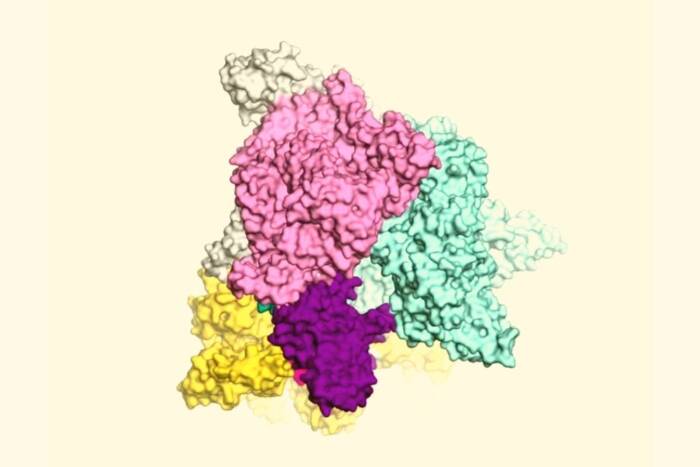Rockefeller designated a “Milestones in Microbiology” site by the American Society for Microbiology
by AMELIA KAHANEY
Infectious disease was once the most serious threat to human health. Research in microbiology changed this by revealing the responsible pathogens and producing therapies to counter their infection. For its critical contributions to this historic transition, this spring The Rockefeller University was named a “Milestones in Microbiology” site by the American Society for Microbiology. A plaque commemorating the honor, presented in April by Stanley Maloy, past president of the society, has been installed on the first floor of the Greenberg Building.

University President Marc Tessier-Lavigne (left) and Stanley Maloy, past president of the American Society for Microbiology, unveil a plaque commemorating Rockefeller as a “Milestones in Microbiology” site at a dedication ceremony in April.
The ASM “Milestones” designation formally recognizes the many outstanding achievements of Rockefeller scientists, and in particular groundbreaking discoveries by Oswald T. Avery, Colin M. MacLeod, Maclyn McCarty, Peyton Rous, and Emil C. Gotschlich.
“Microbiology was the cornerstone of Rockefeller’s mission at our founding, and it remains a vibrant field of study in our laboratories today,” says Marc Tessier-Lavigne, the university’s president. “Today’s generation of Rockefeller microbiologists, immunologists, and cell biologists are building on their predecessors’ twelve decades of work, driving discoveries that will lead to new treatments and cures for infectious disease. We are enormously proud of Rockefeller’s legacy in this field, and on behalf of our scientific community I am greatly honored by this recognition from the American Society for Microbiology.”
Honored for developing the first polysaccharide-based vaccines against groups C and A meningococcal bacteria, Dr. Gotschlich, who is consulting senior physician emeritus at The Rockefeller University Hospital and R. Gwin Follis-Chevron Professor Emeritus, spoke at the dedication ceremony, at which the plaque was unveiled. He outlined the history of vaccine development against meningococcal meningitis, a disease that once spread in epidemic waves with a mortality rate of 70 percent or more. Since their creation, group A and C vaccines have been administered to millions of people.
The American Society for Microbiology is the largest single life science society, composed of over 39,000 scientists and health professionals. Its mission is to advance the microbiological sciences as a vehicle for understanding life processes and to apply and communicate this knowledge for the improvement of health and environmental and economic wellbeing worldwide.
Previously designated “Milestones in Microbiology” sites include the Waksman Laboratory at Rutgers University; Hopkins Marine Station in Monterey, California; the site of the University of Pennsylvania Laboratory of Hygiene; Scripps Institution of Oceanography; the Tulane University School of Public Health and Tropical Medicine; Cold Spring Harbor Laboratory; the Microbial Diversity Course at Marine Biological Laboratory, Woods Hole; Storrs Agricultural Experiment Station at the University of Connecticut; and the University of Wisconsin–Madison, Department of Bacteriology.


